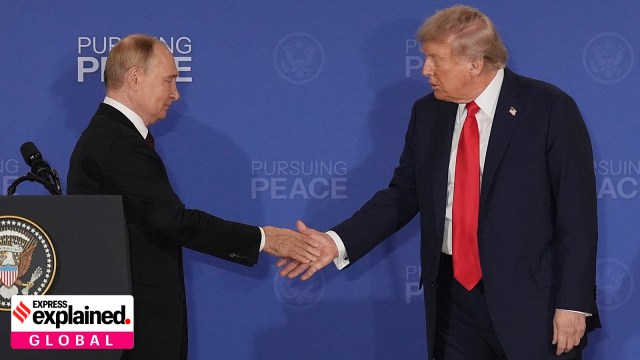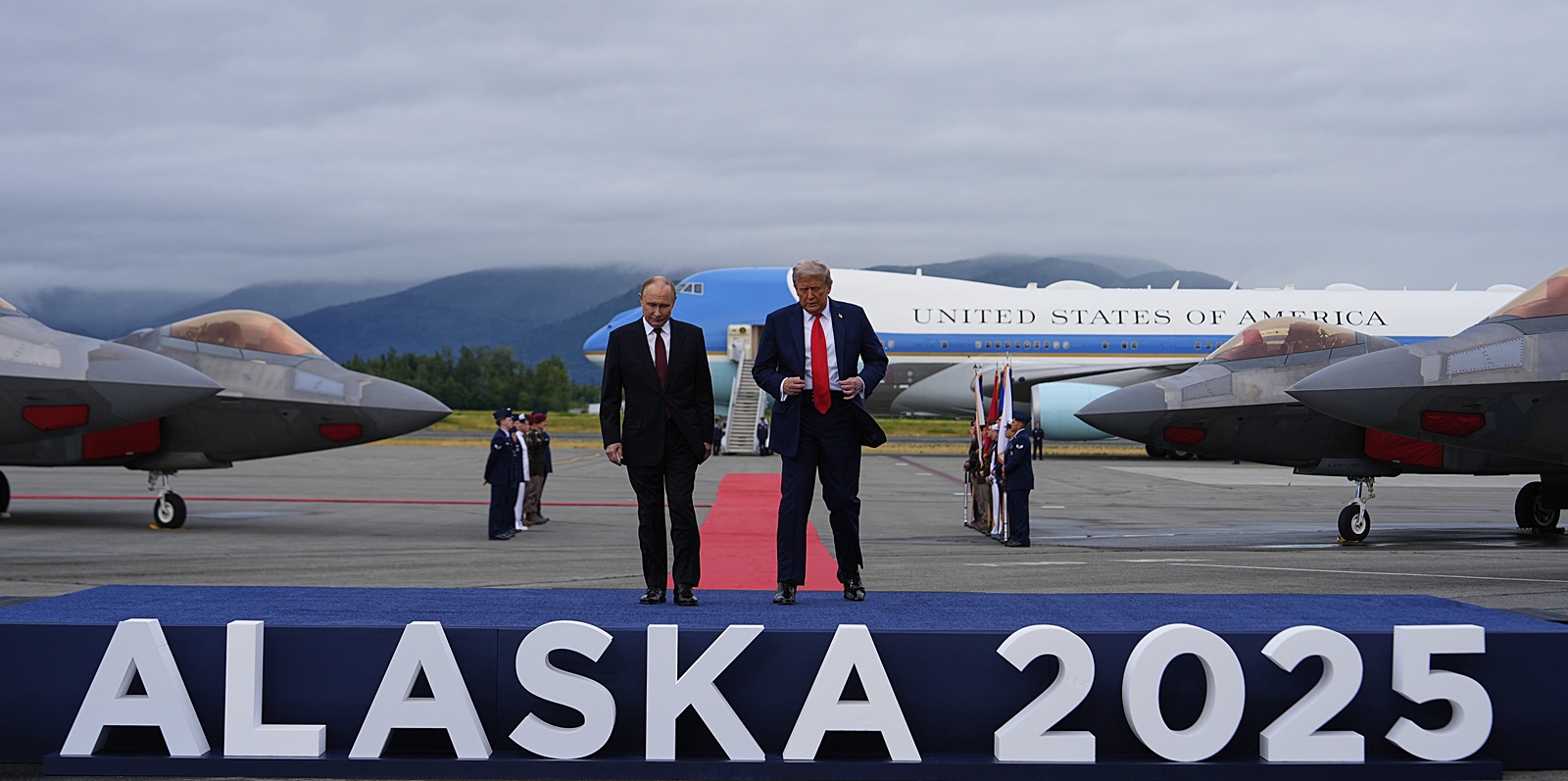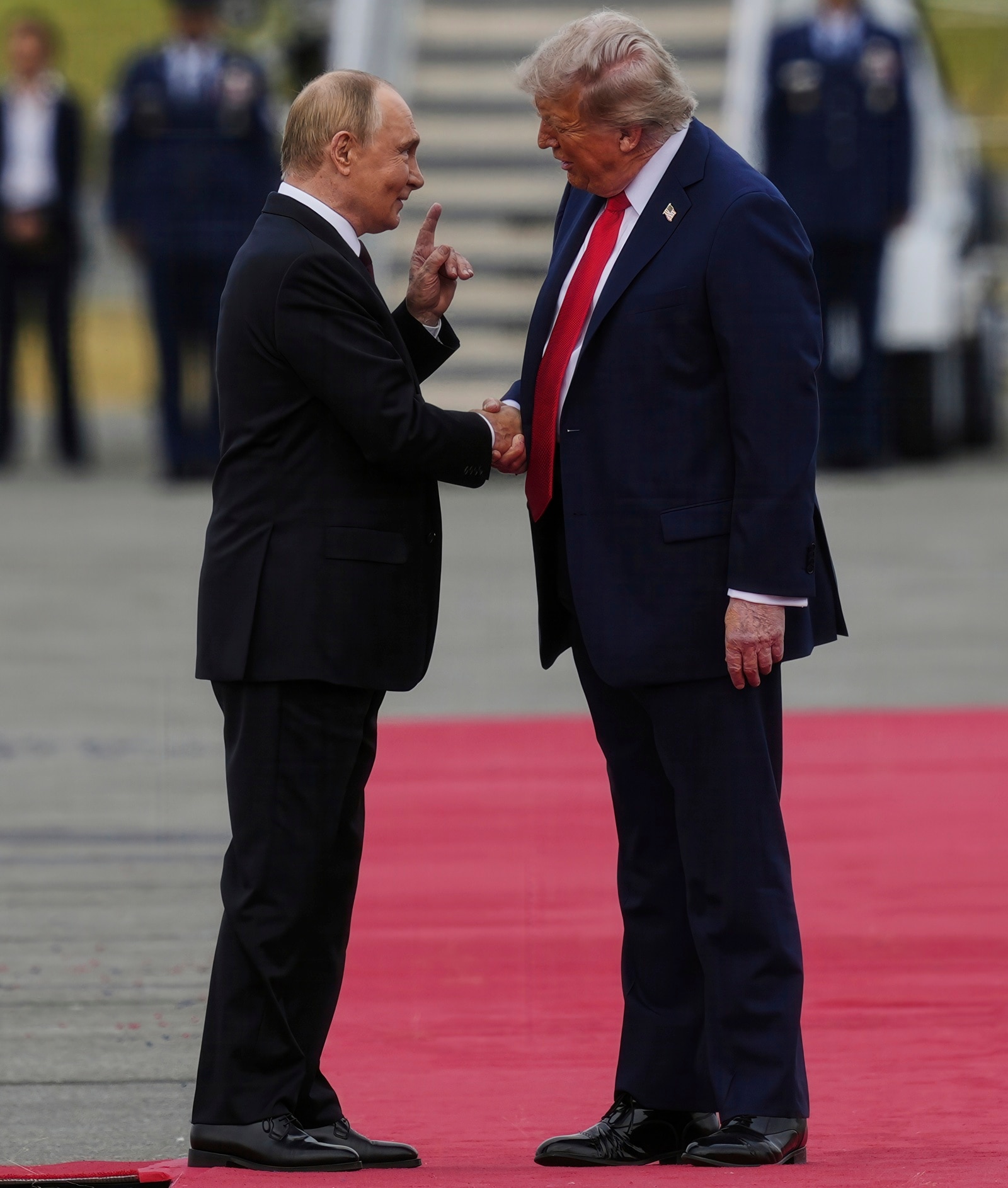Unfinished Alaska talks, US-Russia ties: Beyond oil tariff against India
The Modi government will hope that Washington and Moscow will arrive at a final agreement on how to deal with Ukraine and Trump will discard the 25 per cent additional tariff. At the minimum, Delhi would want Trump to postpone the deadline of August 27 for implementing the additional tariffs against India.
 President Donald Trump shakes the hand of Russia's President Vladimir Putin during a joint press conference in Alaska on Friday. (Photo: AP)
President Donald Trump shakes the hand of Russia's President Vladimir Putin during a joint press conference in Alaska on Friday. (Photo: AP)If India was counting on a clear and positive outcome from the Alaska summit to avert the additional 25 per cent US tariff on Indian exports, it will be disappointed by the inability of Donald Trump and Vladimir Putin to deliver last night. The unfinished US-Russian talks in Alaska leave a cloud of uncertainty over India’s trade negotiations with Washington. On the upside, though, there was no breakdown of engagement, and the two leaders remain hopeful of an accommodation. As the details of the summit conversations come into public view, India will have to look beyond the tariff question at the implications of a potential reset in Russia’s relations with the US and the West.
At their joint press appearance, Putin spoke of the “agreement” between the two leaders that “will pave the path toward peace in Ukraine”.
Trump was less definitive. “There’s no deal until there’s a deal,” he said. “We didn’t get there, but we have a very good chance of getting there… There are just a very few (sticking points) left,” Trump said. “Some are not that significant. One is probably the most significant — but we have a very good chance of getting there,” he added, without identifying the issues.
While the initial assessments of the summit focused on the lack of an agreement on ceasefire in Ukraine, Trump and Putin appear to have elevated their ambitions to sketch out the terms of a broader peace deal. As Trump said in a social media post on Saturday, “the best way to end the horrific war in Ukraine is to go directly to Peace Agreement” and not a mere pause or a ceasefire.
 President Donald Trump walks onto a stage with Russia’s President Vladimir Putin in Alaska on Friday. (Photo: AP)
President Donald Trump walks onto a stage with Russia’s President Vladimir Putin in Alaska on Friday. (Photo: AP)
Trump briefed Ukrainian President Volodymyr Zelenskyy and key European leaders on his discussions with Putin. He is expected to meet Zelenskyy at the White House on Monday. Zelenskyy and the European leadership have extended cautious support to Trump’s attempted peace deal. There is speculation about the Russian leader signalling greater flexibility on Moscow’s approach to peace. Once the Europeans rally around, there is a possibility of a trilateral meeting between Trump, Putin and Zelenskyy that could advance the talks towards a peace deal. Putin, for his part, expressed hope that US allies would not undermine any understandings reached with Trump.
Putin put special emphasis on improving bilateral ties with Washington. He noted that Russia and the US are neighbours across the Northern Pacific, evoked their wartime cooperation during the Second World War, and highlighted the potential for broad commercial and strategic engagement – including in the areas of high tech, outer space and Arctic. He also pointed to the growing trade volumes between US and Russia since Trump took charge in January this year.
Trump has invested significant political capital in building a partnership with Moscow. But before he can cash in on the investment with a significant peace deal, he has to overcome deep resistance within Washington’s foreign policy establishment, and across the Atlantic, on the terms of peace and reconciliation with Russia.
 President Donald Trump greets Russia’s President Vladimir Putin in Alaska on Friday. (Photo: AP)
President Donald Trump greets Russia’s President Vladimir Putin in Alaska on Friday. (Photo: AP)
Delhi’s immediate concern is centred on the punitive measures against India that Trump has inserted into his Ukraine strategy. As part of the effort to pressure Putin into accepting a peace deal, Washington announced an additional 25 per cent tariff on Indian exports — explicitly linked to Delhi’s continued purchase of Russian oil.
Since the 2022 invasion, India has become a major buyer of discounted Russian crude, a move that has improved its energy security but drawn sharp criticism from the West. The US administration argues that targeting India, among other large importers, will cut into Moscow’s revenues and push it toward compromise in Ukraine.
On the eve of the summit, US Treasury Secretary Scott Bessent warned that more tariffs could follow if no peace deal emerged. He urged Europe, which imports refined petroleum products from India, to join Washington in imposing severe sanctions on countries still trading extensively with Russia. Meanwhile, a major Bill moving through Congress would authorise the President to impose tariffs of up to 500 per cent on states helping sustain Moscow’s war economy.
For now, Delhi must await greater clarity on the summit’s outcome, the future trajectory of the Ukraine talks, and the next steps from the US and Europe. One conclusion though is hard to avoid: India’s big turn to discounted Russian oil over the last three years has tied it, if indirectly and unwittingly, to the geopolitics of war and peace in Ukraine.
The Modi government will hope that Washington and Moscow will arrive at a final agreement on how to deal with Ukraine, sooner than later, and Trump will discard the 25 per cent additional tariff. At the minimum, Delhi would want Trump, who continues to be optimistic about a breakthrough, to postpone the deadline of August 27 for implementing the additional tariffs against India.
In a TV interview after the summit, Trump said he would revisit the question of oil-related tariffs in a couple of weeks, when the prospects for a deal on Ukraine might be clearer. If there is no peace, however, Delhi will have to redo its sums on the costs and benefits of India’s current reliance on Russian oil. In the event of a progress towards reconciliation in Ukraine, Delhi will have to prepare for a major shift in great power relations between US, Russia, Europe and China.
(C Raja Mohan is a contributing editor on international affairs for The Indian Express)



- 01
- 02
- 03
- 04
- 05



































